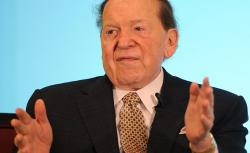The call came in from the “blocked” number, and like a fool I answered it.
“Mr. Weegal? Why-gell? Hi, I’m calling on behalf of Russ Feingold and the Progressives United PAC.”
If I made a donation, I would help the former senator combat corporate personhood and save America from the Citizens United decision. The super PACs would be humbled. Feingold could continue accusing the president of “dancing with the devil” when he courts the Supers.
The solicitor seemed like a very nice person, with a lousy job; I don’t donate to political causes. (There is a hint for you here, Ron Paul’s Campaign for Liberty.) Unfortunately for the cause, it’s getting harder to argue that super PACs have horribly degraded our elections. In this first presidential election since the dawn of the supers, they have actually—and probably by accident!—given us a more competitive, transparent Republican primary. They are, in a sense, a good thing for our democracy.
Start with the “competitive” part. Subtract the super PACs, and Mitt Romney would have outraised his Republican competitors by a factor of at least 2-1, in most cases 5-1. In 2011, Romney’s campaign raised $56.5 million and spent $36.6 million. His closest competitor, Ron Paul, raised $25.9 million and spent $24.0 million. The two of them, who’d built national fundraising networks in 2008, raised more than the rest of the Republican field combined—$80.5 million to roughly $73.6 million.
Add in the super PAC money and the advantage fades. Romney’s campaign had outspent Newt Gingrich’s campaign by a 7-2 margin and outspent Rick Santorum’s by a 19-1 margin. According to the Sunlight Foundation, which has tracked the super PACs all year, the Romney-centric Restore Our Future PAC outspent the pro-Gingrich Winning Our Future PAC only 2-1. It outspent the Santorum-philic Red, White and Blue fund by slightly better than 8-1, which was just what the PAC needed to spend to get its candidate into an Iowa tie.
“Take away the super PACs, and Santorum would have probably had to drop out after Iowa,” says Bill Allison, editorial director of the Sunlight Foundation. “Gingrich might have had to drop out after South Carolina.”
The super PAC critics aren’t moved by the election results: The PACs are rotten and unfair. In the words of Democracy Now producers, the PAC money comes from a “secretive coterie” of donors. In the terrific coinage of Mother Jones editors, it’s “dark money,” a Lovecraftian monster that moves from state to state, dissolving the foundations of the republic.
It is too secretive. Most campaign money is. But here’s the twist: There’s more information out there about super PAC donors than there is about virtually any other kind of campaign fundraising. Maybe it’s the novelty, maybe it’s the size of the checks, but the rise of the super PAC has come with constant, clickable scrutiny from the Fourth Estate.
The best example of this: Winning Our Future and Sheldon Adelson. When the New York Times’ Nick Confessore and other reporters started chasing rumors that Adelson’s network backed Gingrich, the casino magnate (net worth $22 billion or so) came under close scrutiny. Every major newspaper profiled him. At press events, Gingrich was asked about him. A quick Lexis-Nexis search tells us that Adelson has been mentioned on 189 news broadcasts since the start of 2012, almost all of them in relation to the Gingrich money.
What about Rick Santorum’s savior, Foster Friess? The cowboy-hatted billionaire has given louder and prouder speeches about his campaign money than any tycoon since George Soros. He’s given interviews to the New Republic and the Washington Post. He introduced Santorum at last week’s Conservative Political Action Conference. Friess has acted like a venture capitalist, putting seed money in a product and then shouting from the mountains about how more people should buy in.
The big fear about campaign money is that it corrupts the candidates who have to beg for it. “It’s simply wrong for our democracy,” says Fred Wertheimer, president of the campaign watchdog group Democracy21, “that an individual or his spouse can give $10 million to a particular candidate and thereby potentially buy corrupting influence at the expense of the electorate.”
But that worry applies better to the shadowy bundler than it does to the megabucks super PAC donor. Corruption can’t grow in the sunlight. The people giving big to super PACs are famous. I didn’t fully understand how famous until I tagged along with Gingrich at a speech to Aloma Baptist Church in Florida, when a parishioner asked him to explain why he was taking dirty money from the gambling industry. Gingrich explained that he and Adelson had a simpatico, guns-a-blazin’ view on Israel. Is it corruption if the candidate tells you what he’ll do for the donor?
If only the rest of the campaign finance system worked that way. Allison and Wertheimer, who worked very hard to cure my Pollyannish take on the cuper PAC, point out that the smaller donations, and the ones newly, legally laundered through 501(c)(3) groups, are handy hideouts for corruption. “Take Solyndra,” says Allison. “There’s not a single story that mentioned how an Obama bundler invested in this solar company that got a huge government loan guarantee. That only happened when the thing went bankrupt.”
This is fixable. Maybe. House Democrats have introduced a new version of the DISCLOSE Act, the reform bill that would require total transparency on PAC funding. It’s probably doomed—the Chamber of Commerce doesn’t like items like a requirement for CEOs to appear in the commercials—but it’s the kind of reform Republicans frequently claim to want—total donation freedom, total transparency. Our super PAC education, so far, has consisted of fat checks matched with information about the check-cutters. We know more about those guys than we know about the bundlers, who’ve been passing money under the table for years. So which of those systems is worse for our democracy?
